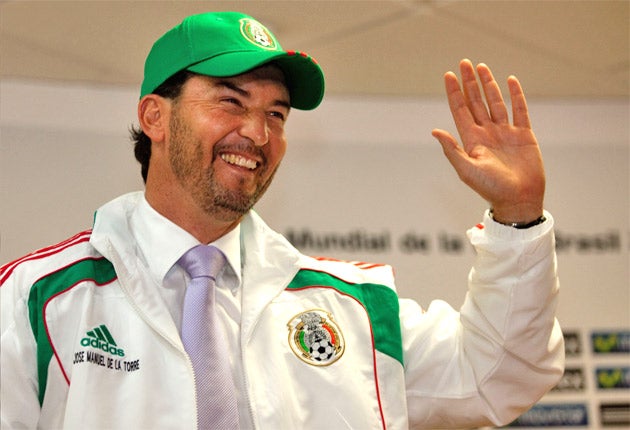Mexico welcome new manager as challenges loom on and off pitch

Jose Manuel de la Torre succeeded Javier Aguirre as Mexico coach yesterday and now faces the task of steering his team through to the 2014 World Cup finals in Brazil.
"It has been my dream all my life," De la Torre told a news conference on accepting the job, which he will begin once his club, Toluca, have completed their campaign in the Apertura championship, which ends in December.
"Once I've finished that commitment, I'll take charge of the national team," said the 44-year-old, nicknamed Chepo.
Aguirre resigned in July after Mexico's second-round defeat by Argentina at the World Cup finals in South Africa and the position has since been occupied in an interim capacity by several coaches. De la Torre was originally competing for the job with Monterrey's Victor Vucetich, who pulled out over the weekend citing family reasons.
The appointment comes with the team in crisis after the Mexican Football Federation (FMF) punished 13 players for holding an unauthorised late-night party after a friendly last month. The players threatened to boycott team call-ups and De la Torre's brother, Nestor, resigned from the post of FMF national teams director. He had suspended the forward Carlos Vela and midfielder Efrain Juarez for six months for breaking team rules and another 11 players, including the World Cup captain Rafael Marquez, were fined.
De la Torre has had a short but successful coaching career, winning league titles in his first job as head coach with Guadalajara in the 2006 Apertura championship and again in his first season with Toluca, the 2008 Apertura. Toluca are the reigning champions after winning another title in the 2009-10 season's "Bicentenario" Clausura championship this year.
Mexico will take part in two tournaments next year, the Concacaf Gold Cup in June and the Copa America, the South American championship, in Argentina in July.
The hosts, the holders Brazil and Uruguay will be the seeds for next month's draw for the 2011 Copa America, the South American Football Confederation (CSF) said yesterday.
Chile, although not seeded to head one of the three groups, have been guaranteed they will play in the Andean region of Cuyo, just across their border with Argentina.
"The only team with definite cities is Chile, who will go to the Cuyo region," the CSF general secretary Eduardo Deluca told reporters at the body's headquarters outside Asuncion, Paraguay, where it held an executive committee meeting.
The draw for the 12-nation tournament to be played in Argentina next July will be held on 11 November in the Argentine city of La Plata, capital of Buenos Aires province.
Cuyo comprises the western provinces of Mendoza and San Juan. Other venues are Salta and Jujuy in the north-west and Santa Fe and Cordoba in the centre-north.
Each seeded team will play two matches in their venue stadiums and one in La Plata, which is 60km (38 miles) from Buenos Aires. River Plate's Monumental, which doubles as the national stadium in the capital, will host the 24 July final.
"The seeded team that ends up in the same group as Chile will have to play two matches in the area of San Juan and Mendoza and one match at the City of La Plata stadium, since all the seeds are going to play one match there," Deluca said.
Argentina and Uruguay have won the Copa America 14 times each. Brazil, who beat Argentina in the last two finals in 2004 and 2007, have won it eight times.
Regular guest team Mexico and Japan have been invited to join the 10 CSF member nations playing in the tournament.
The meeting also discussed the South American qualifiers for the 2014 World Cup in Brazil and Deluca said the CSF would fight to retain its four and a half places. The half- place is valid for a playoff with a team from another confederation. Brazil are automatically qualified for the next World Cup as hosts.
"We are prepared to defend [our places] tooth and nail because when [the World Cup] was played in Asia, the Asian berths were respected and the same happened with Africa and Europe."
Subscribe to Independent Premium to bookmark this article
Want to bookmark your favourite articles and stories to read or reference later? Start your Independent Premium subscription today.

Join our commenting forum
Join thought-provoking conversations, follow other Independent readers and see their replies